Apologies for the Becket obsession, but I’ve just found an mp3 file made from two of the better Peter O’Toole rants in the film.
Month: January 2007
Lubezki at the desk
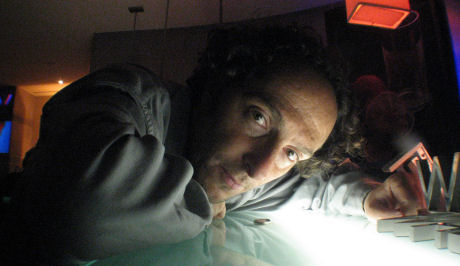
Taken at the conclusion of a sit-down interview last night with Children of Men cinematographer Emmanuel Lubezki at Westwood’s W hotel — Tuesday, 1.30.07, 8:40 pm. Lubezki’s work in this Alfonso Cuaron film (particularly those three extra-long unbroken shots, which became the stuff of instant legend as soon as the film started to screen) is, I feel, monumental. I’ll post the audio interview plus a write-around up later this afternoon.
Dull Oscar show
“Younger viewers live their lives pushing the envelope, breaking rules and bending rules,” Manhattan ad exec Shari Anne Brill tells The Envelope‘s Scott Collins. “As long as the Oscars are perceived to have a certain rigidity, they’re not going to be relatable to young people.” Adds [publicist Howard] Bragman: ‘The problem with the shows is that they lack any kind of spontaneity or buzz factor.'”
Collin’s piece suggests/contends that the show may get higher ratings if Borat‘s Sacha Baron Cohen is given two or three minutes worth of microphone time. This is because his “ribald acceptance speech at the Golden Globes…was perhaps the only buzz-worthy moment in a night otherwise deemed fairly dull. And though he may not have been single-handedly responsible, ratings climbed too: The telecast delivered a total of 20 million viewers, up 6% compared with the previous year, according to Nielsen Media Research.”
Of course, the only way Cohen would have any real impact would be if he was hosting the show, which he’s not — Ellen DeGeneres is. I’ve said this a couple of times over the past year, and here goes again: if the Oscar show producers want their stately presentation to have spontaneity or buzz factor or simple hilarity, get Sarah Silverman to host it. She killed at the IFP Spirit Awards last year, and her comic sensibility is right in the under-40 groove — provocative, nervy, deadpan/put-on.
Finke of why “Dreamgirls” lost
Nikki Finke is reporting that last Saturday night, at a swanky dinner party thrown by movie producer Leonard Goldberg in honor of Viacom honcho Sumner Redstone, that Redstone passed along a Dreamgirls post-mortem that had originated with Paramount Pictures chief Brad Grey. Redstone told the gathering that Brad explained that the reason Dreamgirls wasn’t nominated for a [Best Picture] Oscar was because “everyone hates David.” As in Geffen, the producer of Dreamgirls.”
Ice Bucket
After hearing yesterday of his death, I tried to recall a vivid movie memory pertaining to Sydney Sheldon, the very successful screenwriter, TV producer, Broadway producer and hack romance-novel author. I thought and thought, and the only thing that punched through was a moment from 1977, when I was watching The Other Side of Midnight — a somewhat grotesque soap-opera about an ambitious hottie (Marie France Pisier) climbing her way to wealth and privelege through a series of relationships with powerful men — in a small theatre in Westport, Connecticut.
I’m speaking of the pseudo-legendary ice-bucket scene between Pisier and Raf Vallone, playing an Aristotle Onassis-like tycoon, and a moment when a naked Pisier, riding Vallone like an equestrian, grabs a handful of ice cubes from a nearby bucket and, at the moment of orgasm, mashes the ice into Vallone’s privates. The camera doesn’t show this — we are shown only an insert shot of Pisier’s hand scooping up the ice, and then we hear Vallone moan like a large animal who’s just been speared.
No offense to Sheldon’s memory, but that, for me, in my moviegoing life, is the most memorable thing that Sheldon produced, and for all I know the scene wasn’t even in the book — it may have been an invention by Herman Raucher, the screenwriter who adapted Sheldon’s book, or director Charles Jarrott.
Condon tribute pics
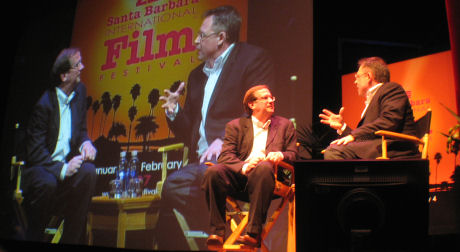
Pete Hammond (l.), Dreamgirls director Bill Condon (r.) at last night’s tribute to Condon at Santa Barbara’s Lobero Theatre — Monday, 1.29.07, 8:25 pm
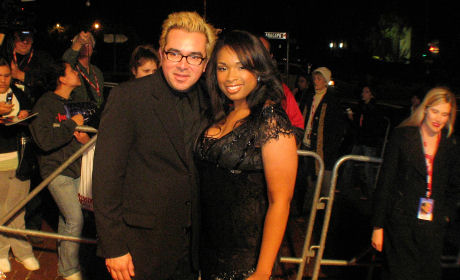
Santa Barbara Film Festival director Roger Durling, Dreamgirls star Jennifer Hudson outside the Lobero Theatre prior to the show — Monday, 2.1.07, 7:35 pm
Berlin Film Festival sked
For anyone heading to the 57th Berlin International Film Festival (February 8 thru 18), here’s a programming rundown. One note of concern ; Gregory Nava‘s Bordertown, the Jennifer Lopez drama about the scores of unsolved Juarez-El Paso female murders, is skedded to be shown. This turkey has been looking for a distributor for eons and finding no love. Lopez movies are almost always mawkish, straining, off-balance. Didn’t she say she was looking to quit movies a while back? That awful Bronx accent she accentuates in the trailer for El Cantante is beyond grating — it rivals Lorraine Bracco‘s in Medicine Man.
Lurie’s Boxing Flick
I had only one medium-sized problem with the rough version of Resurrecting the Champ, which director Rod Lurie showed me several weeks before it played at Sundance ’07. The problem was Samuel L. Jackson‘s decision to play the lead character, a homeless guy with a secretive past, with a “whinny” voice — a raspy-reedy emission that feels like the polar opposite of Jackson’s usual sonorous, street-cat tenor-baritone thing.

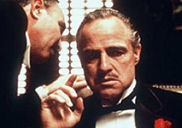
Jackson in Resurrecting the Champ; Brando in The Godfather
The performance itself is solid and emotionally on-target, but I felt two ways about the whinny — it reminded me of Marlon Brando‘s voice after he gets shot in The Godfather (“We didn’t have enough time, Michael….not enough time”) and it felt a little too actorish, by which I sorta kinda mean indulgent. Like Kevin Costner‘s mid-Atlantic accent in Robin Hood, it seems to get in the way more than anything else. Forces of nature like Jackson should never do voices or accents — movie stars should always be the same guy.
Jackson’s performance has been totally captivating for some. The Hollywood Reporter‘s Duane Byrge called it “knock-out ” and “terrific,” so take my opinion with a grain. (For whatever reason, Variety didn’t review it during Sundance.)
I wrote several weeks prior to Sundance that I’d seen a rough version of Champ. The version that was shown in Park City was, I’m told, 10 or 15 minutes shorter. I’m still not going to spill anything, but the script — written by Lurie, Allison Burnett, Michael Bortman and Chris Gerolmo — has a fascinating second-act turn. The nominal plot is about a youngish, not-quite-established sports reporter (Josh Hartnett) lucking into a big story when he discovers that a frail homeless guy (Jackson) is actually a former heavyweight boxing champion previously thought to be dead. But the title doesn’t mean what you might think.
Alan Alda and Peter Coyote give the best supporting performances. The most unwelcome (for me, in the longer cut) was Kathryn Morris‘s performance as Hartnett’s wife. Not because she’s unskilled or unappealing (far from it) but because she chose to wear a pissed-off, nagging-wife, guilt-trip expression during the bulk of her screen time. I delicately suggested to Lurie that he do something about this in the final edit — it’s the same expression my ex-wife used to have when our marriage was falling apart, and as much of an asshole as this might make me sound, it felt irritating as shit to absorb this on a scene-after-scene basis.
Carrey’s Crash
In a piece timed to ride the marketing back of Number 23 (New Line, 2.23), the Joel Schumacher creeper about a face-painted wackjob obsessive played by Jim Carrey, industry journalista Kim Masters has written about Carrey’s career “crash” in the new Radar, which will hit the stands in about two weeks. Radar‘s publicist won’t show me the article, but it’s at least partly about the big-studio plug-pullings of Used Guys and Ripley’s Believe It Or Not, both of which Carrey had intended to star in.
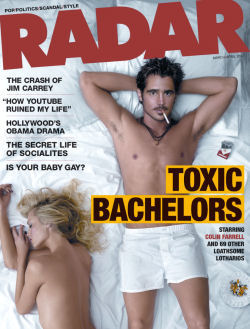
Stone on “LMS” doctrine
“Whatever Little Miss Sunshine is about, it isn’t about anything bad,” Oscarwatch.com’s Sasha Stone wrote yesterday morning, echoing Richard Corliss‘s just-posted views in Time. “It’s all good. It deals with the goodness of humanity underneath it all; it has an idealist’s view of people. It is the only one of the five [Best Picture nominees] that does.
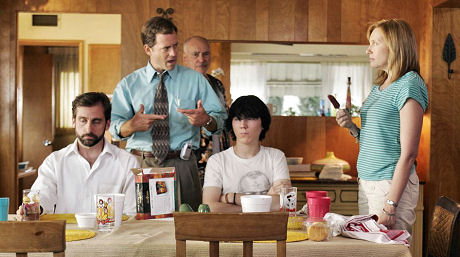
“The country needs to vote for Little Miss Sunshine because to do anything else opens the door to the truth. We can’t handle the truth, not right now, not when we don’t really know what’s coming next.
“Like the psychiatrist who tells Alvy Singer in Annie Hall that “the universe won’t be expanding for billions of years yet, Alvy, so why don’t we enjoy ourselves while we’re here?”, films like Little Miss Sunshine, Crash, Million Dollar Baby and A Beautiful Mind affirm our need to believe that we are all honorable, good people. Moreover, [that] good people win even when they’re losing.”
And yet each of the above-listed films burrows into some pretty dark places. They may have presented positive portraits of their characters and worked with sanitized and/or tidied-up plots, but they don’t give the impression of shirking or sugar-coating life in its more subterranean realms. Family dysfunction, career failure, suicide, insanity, euthanasia, racism — hardly escapist-minded subject matter.
White on “Becket”
Armond White‘s N.Y. Press review of Becket is more than a little similar to an appraisal I wrote last year….odd. Easily the most single-minded Manhattan- maverick critic (at times almost peculiarly so), White is an absolute must-read because of his occasional grand-slams — reviews that pinpoint not only the artistic dimension but the agenda of certain films, like when he called Billy Elliott “a balletomane chickenhawk fantasy.”
“Ostensibly the story of King Henry II appointing his confident Thomas a’ Becket to be Archbishop of Canterbury and then reneging on his bequest — a decision that historically split England’s religious affiliation — Becket is mostly fascinating as a love story between two men,” he writes. “Jean Anoulih‘s stage play is strengthened by the conflict of worldly affection and spiritual devotion when Becket’s born-again allegiance to God takes precedent over his fealty to Henry. This movie version is deeper than anything the makers of Brokeback Mountain could ever conceive — or admit to.
“Reseeing Becket in light of the recent so-called breakthrough for gay film subjects makes one realize how advanced mainstream filmmaking used to be. Peter O’Toole‘s Henry and Richard Burton‘s Becket profess their regard for each other with bold openness and extravagant anguish. Precisely because this affection remains Becket’s subtext, it is never treated as a self-congratulatory end in itself. O’Toole and Burton are artistically free to fully vent their characters’ emotions.”
Director Peter Glenville “subtly encodes this historical epic with sexual intimations: Henry and Becket’s tandem escapades, phallic candles, bareback horseriding, etc. But he takes a dry approach to the complications of lost-love and how these legendary leaders deprived themselves — Becket through an excess of religious fervor, opposing the King’s edict out of personal arrogance; Henry through unchecked emotionalism and personal vengeance.
“This psychological depth gives Becket an edge over the other ’60s dramas about the Plantagenet rulers (A Man for All Seasons, The Lion in Winter, Anne of the Thousand Days) and puts it close to the sophistication of Lawrence of Arabia and, yes, My Own Private Idaho.”
Gonzalez vs. Becket
Village Voice critic Ed Gonzalez pisses on Becket! Fine, permissible, whatever. The guy has chutzpah.
